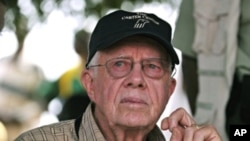Former U.S. President Jimmy Carter says the future of Sudan will depend on how Sudanese accept the results of the just ended general elections.
President Carter expressed hope that victors in the election will invite the losers to join in Sudan’s future and bring about unity both in the south and the north Sudan.
President Carter led his Carter Center poll observer mission to monitor Sudan’s general elections along with other international poll monitors, including the African Union, the European Union, and the Arab League.
President Carter said his center has been involved in other international poll monitoring missions.
“This is the 78th election in which the Carter Center has been involved as observer. And all of the ones that we’ve observed have something challenging about them otherwise we would not be involved. This is the most complex and far reaching election we’ve ever monitored, the largest country we’ve monitored elections in. A lot of preparations were made; a lot of mistakes have been made,” Carter said.
Sudan’s National Electoral Commission (NEC) is scheduled to begin vote-counting Friday after five days of voting in the general elections, which ended Thursday.
The balloting will determine who will serve as national president, president of south Sudan, members of parliament, state governors as well as state assemblies.
The Carter Center’s poll observer mission is scheduled to announce its preliminary findings of Sudan’s vote at a press conference Saturday.
According to the Carter Center, President Jimmy Carter, Judge Joseph Warioba, and Carter Center President and Chief Executive Officer John Hardman will give remarks and take questions from the media at the news conference.
Sudan’s electoral commission granted a two-day extension due to what it described as administrative and technical mistakes in some polling stations.
President Carter said his poll observer mission was instrumental in encouraging the electoral body to extend the vote.
“The Carter Center was one of those groups that urged them to extend the voting period for two more days. I met first with the National Electoral Commission back in February when I was here before and we’ve now met with them twice on this current visit. And I believe that the National Election Commission members have made the best effort they could to correct the obvious errors from the very beginning,” Carter said.
President Carter also said the final results of the election could be known by April 20th after the electoral body has finished tabulating the results.
Analysts say the just ended elections will legitimize President Omar Hassan Al-Bashir’s rule despite an indictment from the International Criminal Court for allegedly committing crimes against humanity in the Darfur conflict.
But President Carter said the vote is an integral part of the 2005 peace accord that ended Sudan’s decades-old civil war between the north and the south.
“This election is mandated by the Comprehensive Peace Agreement; it has to be held in order to carry out the premises of the CPA and hopefully it will lead to peace permanently in Sudan. So, the election is mandatory and of course all of the parties originally agreed to go forward with the elections, all the ballots were prepared on that basis. Some of the parties later withdrew, therefore there was some contention right at the last minute,” Carter said.




